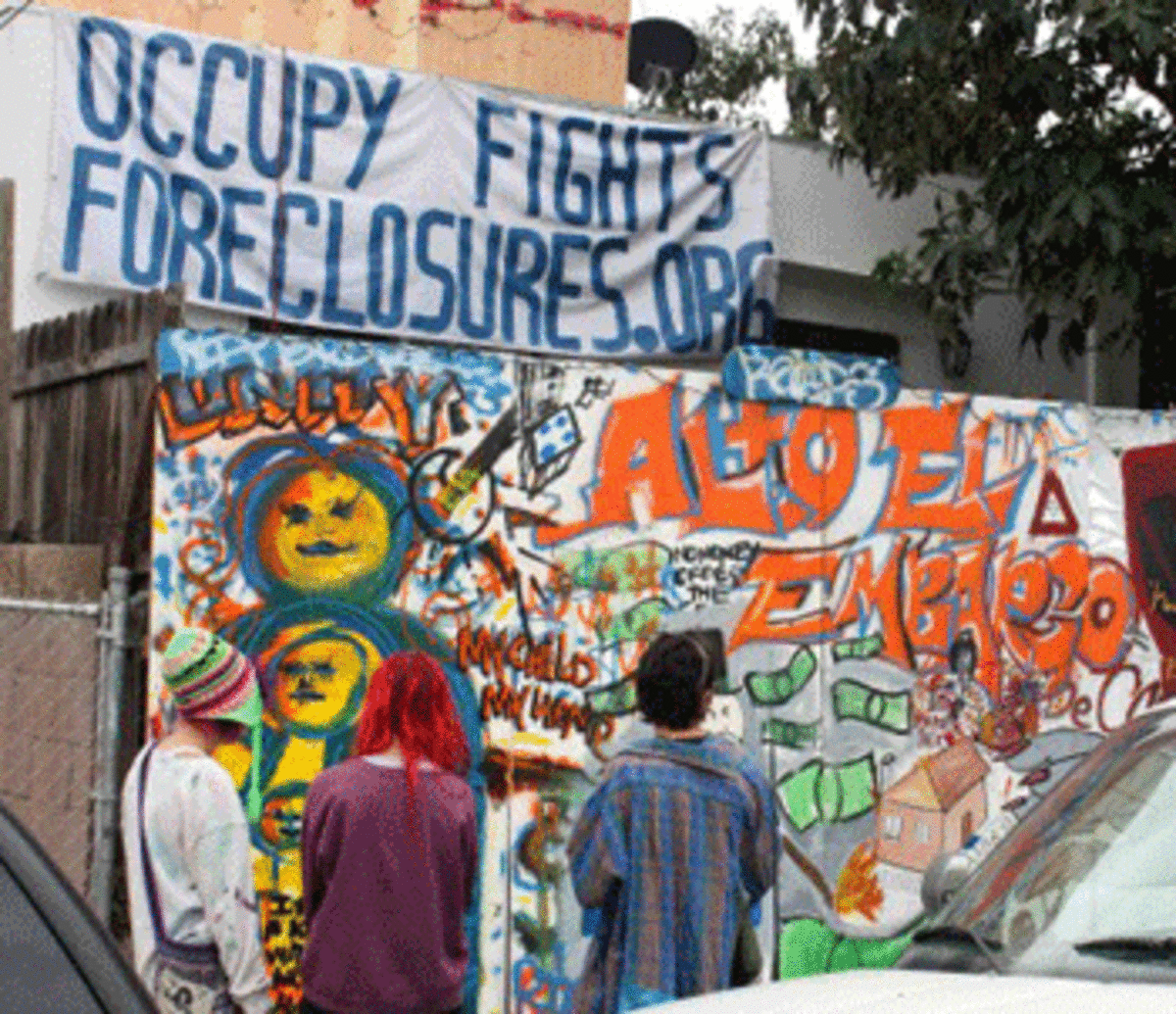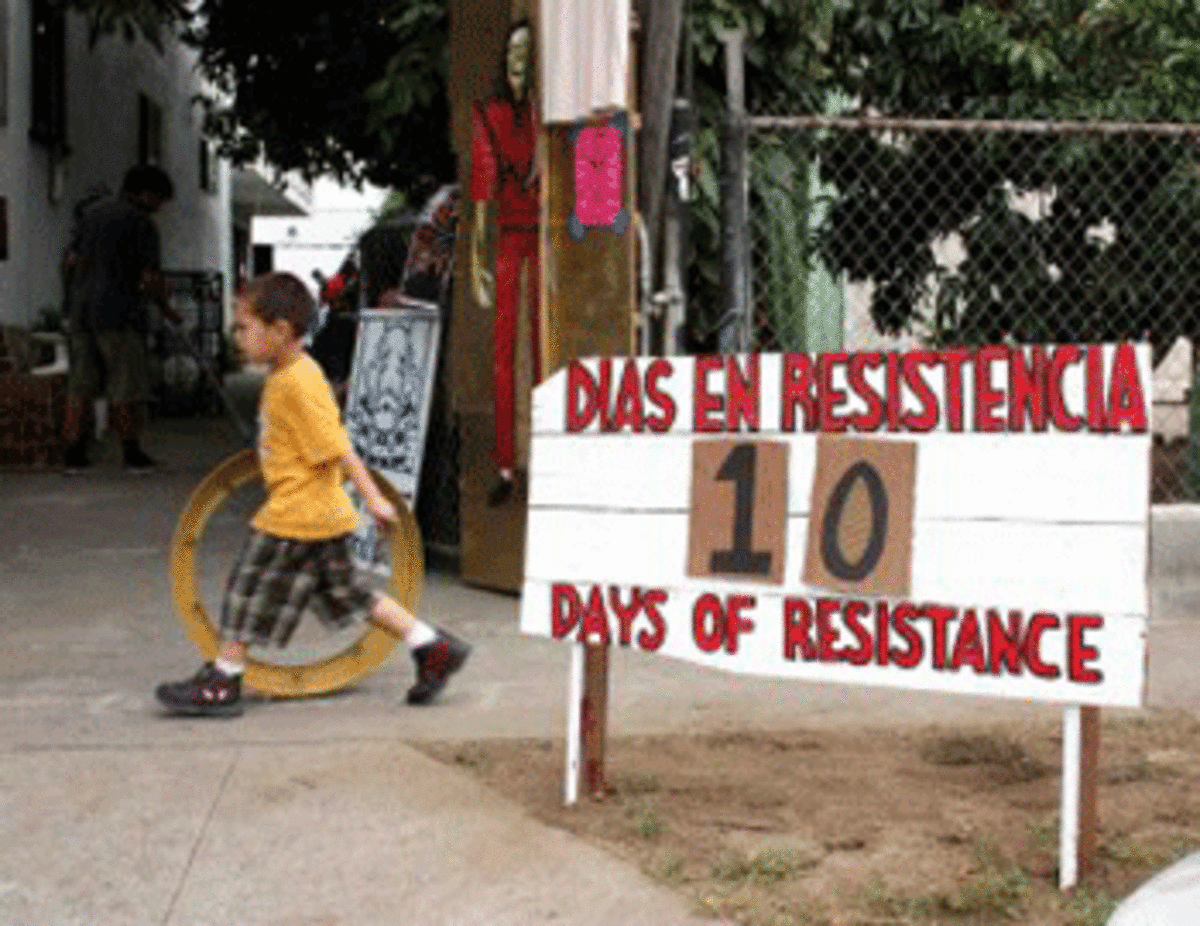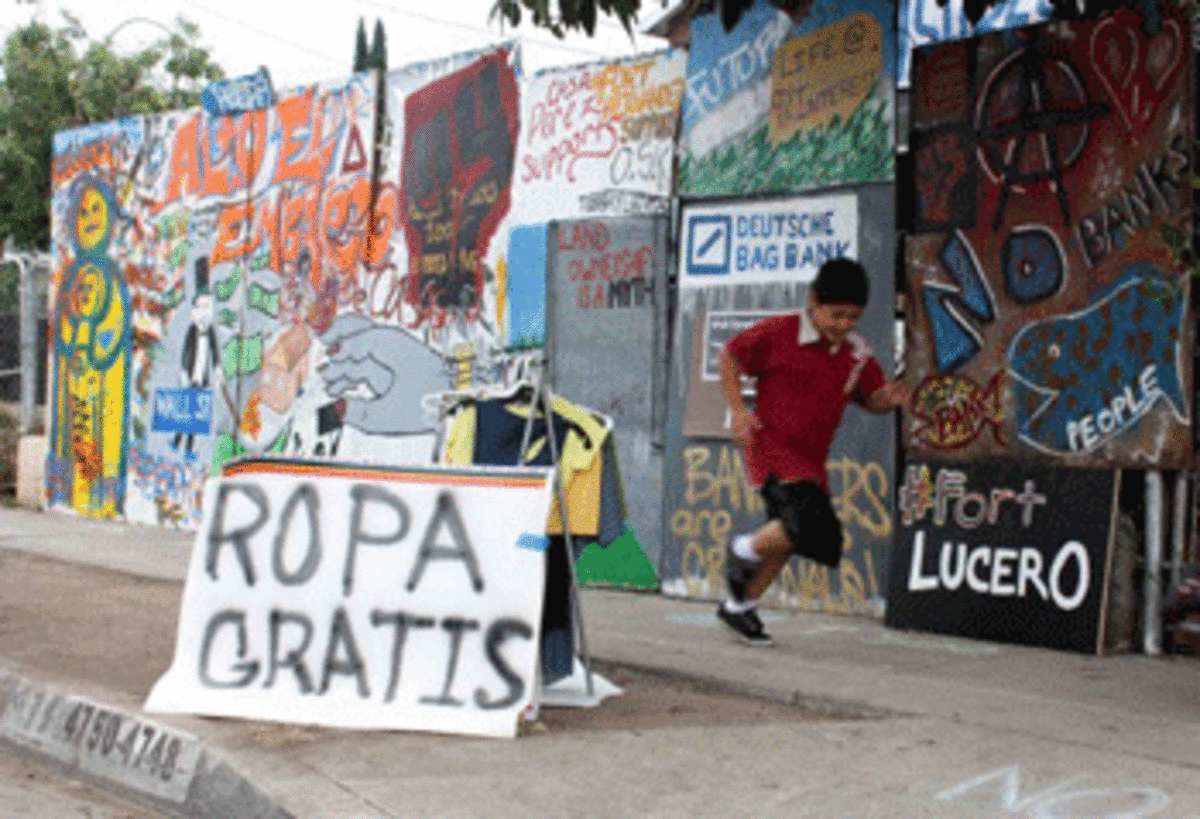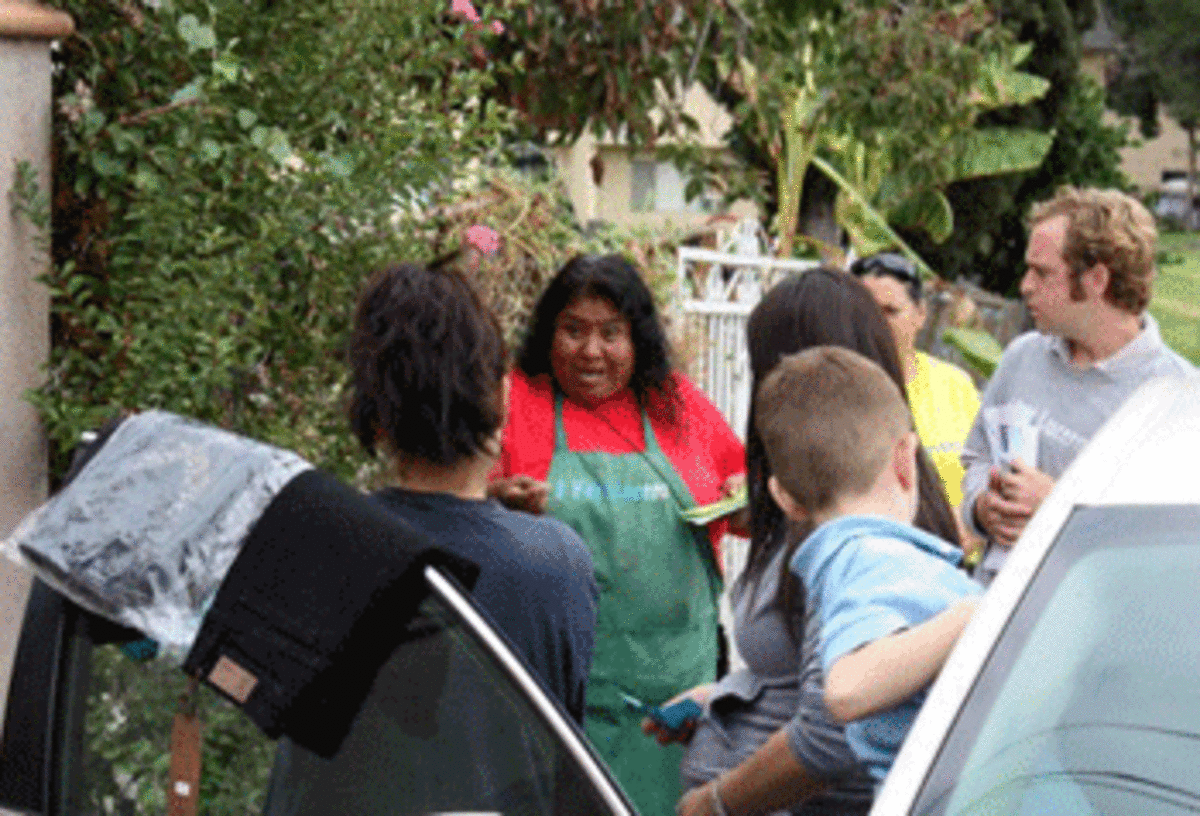
Three occupiers survey the barricade members of Occupy Fights Foreclosures built as part of their efforts to stop the eviction of the Lucero family whose home — commonly referred to now as Fort Lucero — fell into foreclosure after a questionable loan modification. (Dan Bluemel / LA Activist)
Margarita Lucero and her husband are unloading their pick-up truck of clothes. In the back are old televisions and VCRs. These are items they sell at swap meets, she explains.
When asked how she has been, she responds, "No bien. Nervous."
The subject of her worries flies overhead in an overcast sky.
"La policía," she says, pointing to the police helicopter.
Lucero came to the United States from Mexico 25 years ago. After 10 years of hard work, she and her brother, Benito, managed to buy a property that had two houses on it in East Los Angeles.
Now, thanks to a loan modification with Deutsche Bank, they may lose the place they have called home for the past 15 years — though with a little help from Occupy Los Angeles, they won't be going down without a fight.
Their troubles began when the family fell on hard times. When they got their loan modification their problems seemed behind them, but there was one catch they were not aware of — their loan modification was temporary.

A sign posted in front of the Lucero residence announces, on Oct. 20, the number of days their protest has been underway. (Dan Bluemel / LA Activist)
After six months, Deutsche Bank then began refusing their payments and put the home in foreclosure.
Relief came when the Luceros filed for bankruptcy to put off their eviction. The court allowed them to live in the home until Oct. 26. But Deutsche Bank moved forward despite the court ruling.
On September 27, the sheriff's dept. evicted the Luceros. However, they only evicted the front property where Benito Lucero, his wife and two children live.
Oddly, an agent from Carrington Mortgage Services later provided the Luceros a key to the new locks on their home. It is assumed the agent gave the Luceros the key so they could remove a few personal items, thus avoiding the need for future interactions with the family.
However, once the Luceros moved back in, the same agent then filed a report with the sheriff's dept. that the family had broken back into their house. When the sheriffs arrived on October 15, they met resistance and backed down. Lucero by then had reached out to OLA for help. Through their subcommittee, Occupy Fights Foreclosures, or OFF, the group sprung into action.
As a result of turning to OLA, Lucero's home, which is referred to now as Fort Lucero, looks a bit different today. A barricade made of plywood and wood scraps is in front of the property. Spray-painted onto it are images that can only be described as an artistic indictment against the banking industry. The phrase "Alto el embargo," or "Stop the foreclosure," is prominent in the mural.
At the foot of her driveway, a message is written in chalk: "No mas fraude," or "No more fraud," which is repeated on Lucero's roof, but in Christmas tree lights.

n front of Fort Hernandez, free shirts are offered which bear silkscreened slogans concerning the protest. (Dan Bluemel / LA Activist)
Inside, a cadre of occupiers are cleaning. They have prepared coffee and snacks. Literature is on display. Today, they plan to reach out into the community regarding the plight of the Luceros and hopefully build support, because the occupiers need to have a lot of people on their side in order take on the sheriff's dept.
"The banks are banking on the fact that nobody is going to defend the little guy," says Alissa Kokkins.
She is, like many of the occupiers at Fort Lucero, a veteran of Fort Hernandez, a foreclosed home in Van Nuys which the group is similarly defending. The defense of the Hernandez home began on Aug. 25. They celebrated their two-month anniversary on Oct. 20, the same day Fort Lucero was marking its 10th day in existence.
Word seems to be spreading of this strategy of fighting questionable or fraudulent foreclosures that requires one part bravery and one part audacity. Last month, a family in Anaheim who is under foreclosure, began their own action with an Anaheim branch of OFF.
Kokkins says some within OFF have lost their homes as well to foreclosure, giving the group a certain savviness when it must deal with banks, the courts or the sheriff's dept.
"There is this army of resistance growing, because they are displacing all these people," she says.

Margarita Lucero (center) speaks to people in her neighborhood in attempt to enlist community support for her protest. Occupiers hope that concerned neighbors, as well as those in the process of losing their homes, will join their efforts to fight fraudulent foreclosures. (Dan Bluemel / LA Activist)
Anti-foreclosure actions, among others, marks a change in tactics for OLA. Occupier Ryan Rice, who has spent much of his time at Fort Hernandez, told LA Activist earlier this month that actions such as home defense, assisting the homeless and having "really, really free markets," where people share and exchange goods and services without money, does more in the long run than chanting and marching.
"Those are still protests, but they have something substantive," he said. "I mean, the online support for the 'free market' and teach-ins, that's where it is. That's how you are changing the hearts and minds — when [they] see [you] are doing something different that's the alternative."
OFF could be considered one of OLA's sleeper cells. While OLA was attempting to regroup after their eviction from City Hall last November, OFF was continuing to organize.
The creation of numerous offshoots, like OFF or Occupy the Hood, was a strategy that allowed OLA to remain fluid, explains Matt Ward, another veteran of Fort Hernandez who is now at Fort Lucero. In a sense, occupiers created a game of Whack-o-mole for the government. While one group could be potentially be crushed or dispersed, another one pops up in its stead, still bearing the name Occupy Los Angeles.
"That's where Occupy Fights Foreclosures came from," he said. "We felt like it was an opportunity to keep taking the fight to the banks. It was a chance to stand up for the community in a way that would allow us to initiate a dialogue with people who would otherwise be closed off."
Ward fears for Lucero's neighborhood and others like it. He describes the foreclosure crisis as a "land grab" brought about by a multi-national, financial juggernaut, where speculators move in, buy homes and gentrify neighborhoods and push out the community that once thrived there.
"We have to stand up for something, and foreclosures, it is a chance to be Robin Hood, a chance to give back to people who have only ever been taken from," he says. "These international financiers, they don't care about boundaries or borders, they just want money. They just want power."
At the end of the day, Lucero is tired. She and occupiers had earlier broken up into groups, and with fliers and petitions in hand, they spread out into the neighborhood in search of community support.

Darren Taylor of Occupy Whittier speaks to people in Belvedere Park about the Lucero's foreclosure. (Dan Bluemel / LA Activist)
Lucero sits in a plastic lawn chair at the end of her driveway. She still wears her dark-green apron upon which occupiers have silkscreened "#Fort Lucero." Nearby is her friend Augustina and her husband, Jorge Ruvalcaba, who holds their small dog in his arms like a baby.
She explains that her brother couldn't join them today because he had to work. The family works every day of the week to make ends meet. Besides working swap meets, Lucero makes and sells tamales and menudo.
Times have been harder since Ruvalcaba was injured at work.
Ironically, they used to clean foreclosed homes for Fannie Mae. They worked two years for a Fontana-based cleaning company that had a contract with the mortgage buyer.
Lucero and Ruvalcaba were paid $90 for each home they cleaned, each of which typically took one day. She says many of the homes were infested with molds and littered with cat and dog excrement. Strong chemicals were used to clean the homes, but their employer never provided adequate protection, such as masks, goggles or gloves.
Ruvalcaba breathed in a good dose of the stuff when a stove's pilot light blew the chemical back at him one day. He began coughing up blood and losing consciousness. To get him away from the fumes, Lucero says she had to drag her husband out of the home.
Ruvalcaba had to be put on oxygen for a week to relieve the swelling of his lungs.
When Lucero and her husband attempted to get monetary compensation for the accident, their employer denied they ever worked for him. Still, in an effort to avoid a lawsuit, the company's insurance provider offered to pay Ruvalcaba $5,000.
"If they are saying we are not their workers, why are they trying to give us $5,000?" she says through an interpreter.
 On her walk, Lucero went to nearby Belvedere Park and to a church. Talking to anyone who would listen. Everyone did. Only one person annoyed this otherwise seemingly patient woman.
On her walk, Lucero went to nearby Belvedere Park and to a church. Talking to anyone who would listen. Everyone did. Only one person annoyed this otherwise seemingly patient woman.
When Lucero speaks of family, she holds her hand to her chest. A sense of community runs strong within her too, so when she meets someone who is less than neighborly, it gets under skin.
"'Your problem.' … 'Your problem.' … No together," she says. "You need together. … One family."
Dan Bluemel
LA Activist
Published: Tuesday, 23 October 2012
No virus found in this message.
Checked by AVG - www.avg.com
Version: 2013.0.2741 / Virus Database: 2614/5839 - Release Date: 10/18/12
Internal Virus Database is out of date.

No comments:
Post a Comment